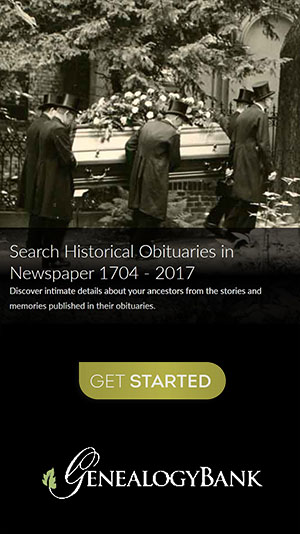Search Death Records (United States)
 U.S. Newspapers, 50 State Full Search (1690-present)
U.S. Newspapers, 50 State Full Search (1690-present) U.S. Obituary Database Search, (1696-present)
U.S. Obituary Database Search, (1696-present) U.S. Birth Announcements Database, (1700s-present)
U.S. Birth Announcements Database, (1700s-present)
Veterans Affairs Buys Land for New National Cemetery
July 22, 2004
The Department of Veterans Affairs (VA) has purchased a 561-acre site in Solano County, California, for a new national cemetery for veterans and their families in the Sacramento area.
"For several years, northern California has been on VA's priority list for building a much needed cemetery to serve more than 354,000 veterans," said Secretary of Veterans Affairs Anthony J. Principi.
The property is 27 miles southwest of Sacramento along Interstate Highway 80 between Dixon and Vacaville. VA purchased it for $6 million. Burials are expected to begin during the construction phase in a small section in the spring of 2006. When the cemetery is fully built in 2007, its 55 acres will provide burial for veterans and family members who live in 16 counties within 75 miles of the site.
This phase of the cemetery's development will provide 14,700 casket gravesites, an 8,000-unit columbarium and 5,100 in-ground spaces for cremated remains, and a scattering garden for cremated remains. The new cemetery will also include an administration and maintenance complex, three committal service shelters, a public information center with electronic gravesite locator and public restrooms, a cemetery entrance area, a flag assembly area and a memorial walkway and donations area. The infrastructure will include roadways, landscaping, utilities and irrigation.
VA expects to begin construction in late fall of 2005. The cemetery staff will work initially from a temporary office, committal service shelter and equipment facility until the construction project is completed.
The nearest open national cemetery, San Joaquin Valley National Cemetery in Gustine, Calif., is 110 miles south of Sacramento.
VA conducted environmental assessments of three possible sites for the cemetery, selected from a much larger number considered throughout four counties. The chosen site not only meets all physical requirements, but offers proximity to San Francisco, 65 miles away, thereby serving a large veteran population. Both the San Francisco National Cemetery and the Golden Gate National Cemetery in San Bruno have space only to inter family members of those already buried.
Veterans with a discharge other than dishonorable, their spouses and dependent children are eligible for burial in a national cemetery. Other burial benefits for eligible veterans include a burial flag, a Presidential Memorial Certificate and a government headstone or marker � even if they are not buried in a national cemetery.
In the midst of the largest expansion since the Civil War, VA operates 120 national cemeteries in 39 states and Puerto Rico, as well as 33 soldiers' lots and monument sites. More than three million Americans, including veterans of every war and conflict -- from the Revolutionary War to the current war in Iraq -- are buried in VA's national cemeteries.
These national cemeteries comprise more than 14,200 acres of land. VA also provides grants to states to build new or expand existing state veterans cemeteries to complement national cemeteries.
Information on VA burial benefits can be obtained from national cemetery offices, from a VA Web site on the Internet at http://www.cem.va.gov or by calling VA regional offices toll-free at 1-800-827-1000.
Information on the Sacramento area national cemetery is available from the VA Memorial Service Network in Oakland at 510-637-6270.
Source: Veterans Affairs, National Cemetery Administration
Search Cemetery Column
Submit a Transcription
Help genealogists worldwide research their family history!
- No cost to publish your transcription- You retain all rights to your work
- No one can edit, change, or delete your work

